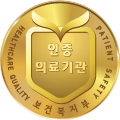 Incheon medical center
Incheon medical center
Always with you
About ICMC
Incheon Medical Center

Incheon Medical Center is a public health system covering the whole metropolitan area of Incheon, a modern macro-city boasting the international airport, the excellent harbor, the outstanding industry and the advancing technology with rapidly expanding population in the vicinity of Seoul, the capital of South Korea.
The history of Incheon Medical Center dates back to 1893 when it started as a medical institution affiliated to Japanese Consulate. The name of the institution changed from Incheon Japanese Governmental Clinic in 1883 to Incheon Public Clinic in 1888, Incheon Japanese Residents Association Clinic in 1900, Incheon Provincial Clinic in 1910, Gyeonggi Provincial
Incheon Clinic in 1930, Gyeonggi Provincial Incheon Hospital in 1940, Incheon Municipal Hospital in 1981, Incheon Public Corporation Hospital in 1985, Incheon Public Corporation Medical Center in 1994, and Incheon (Metropolitan) Medical Center in 2006. Incheon Medical Center has been in collaboration with Seoul National University since 1970 when an educational clinical training program was started at Incheon Medical Center for the house officers dispatched from Seoul National University Hospital.
The core programs of Incheon Medical Center have been for (1) public health consisting of public health education, acute and chronic disease prevention, chronic disease screening, mental health promotion, and control of infectious disease, (2) acute and chronic disease management including allergic disease, hypertension, cardiovascular disorders, cerebrovascular disease, ophthalmopathy, otitis, thyroid disease, diabetes, chronic hepatitis, chronic lung disease, end stage renal disease, prostate disease, and cystitis, (3) cancer management, (4) emergency care, (5) home care and (6) surgical intervention for various surgical diseases. Poor senile Incheon citizens have been benefitted from surgical service free of charge if eligible, including vertebroplasty, replacement arthroplasty, cataract extraction, retinopathy etc.
Incheon Medical Center joined HPH (Health Promoting Hospital and Health Services) in February 2012 (membership 23500034), whose aim has been addressed at improving health gain for patients, staff, and communities, being recognized and supported by WHO. in 2015. Incheon Medical Center has been equipped with negative pressure isolation rooms for the prevention of air borne infectious disease outbreak to carry out the perfect role of sentinel as well as deterrent against any kind of highly contagious infectious disease. Mental health care program is also an active one including psychiatric consultation for mental conflicts, early therapeutic intervention for dementia, and inpatient care for mental disorder.
The comprehensive cancer management is also an important public health program covering prevention, early detection, curative treatment, palliative treatment, home care, hospice, and memorial service. A multidisciplinary task force is carrying out the program consisting of public health, internal medicine, oncology, surgery, gynecology, urology, anesthesiology, infectious disease service, pulmonology, endoscopic service, radiology, pharmacy, nursing service, alimentary service, social welfare aid, and clergy. The program is supported by governmental and municipal fund particularly for the management of gastric cancer, colon cancer, breast cancer, hepatoma, uterine cervix cancer, and other prevalent cancers.



